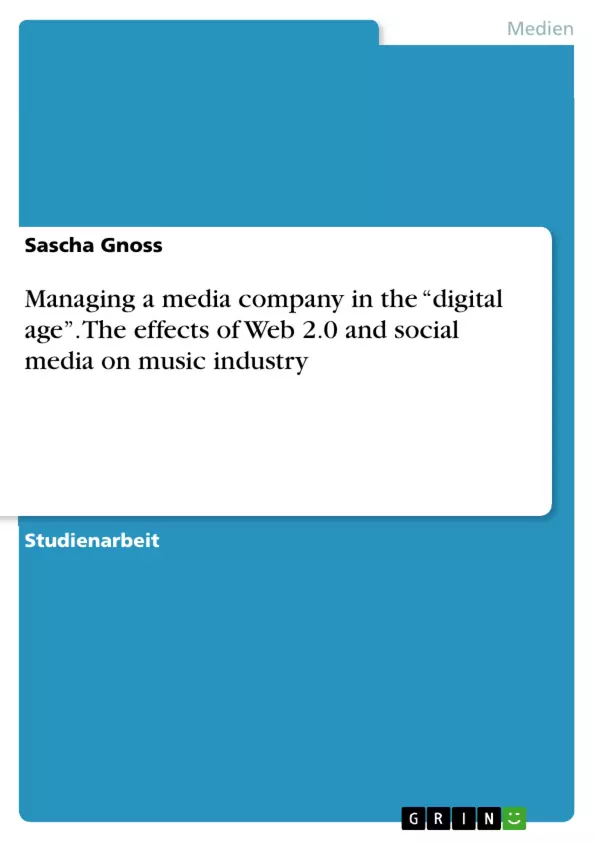The music industry is in the midst of change. This change has been triggered by the influence of new media, such as the Internet or mobile telephones, which contribute to an increasing digitalisation of society during the last years. The results of the growing digitalisation are changes in the consumer behaviour, new devices and also new sales channels. Supply and demand of music products is greater today than ever before; however, the music industry generates only little capital because of illegal downloads and small revenues of the digital music market (Thurner, 2010, pp.5). In the course of the digitalisation, new media plays a big role. Like Peter R. Scott and Mike Jacka put it: “social media is the set of Web-based broadcast technologies that enable the democratization of content, giving people the ability to emerge from consumer of content to publishers” (Scott and Jacka, 2011, pp.5). Due to social media, people have the opportunity to communicate with people all over the world, to share pictures, videos, and audio files (Safko and Brake, 2009, pp.6). Interesting songs or videos are going to spread rapidly from YouTube within social networks like Facebook and Twitter. Therefore, unknown artists can become stars overnight (Urbanowizc, 2013). The digitalisation and social media have changed the framework of the music industry and because of that the management topics of the music companies changed as well.
This assignment identifies and discusses the management topics a company has to deal with in the music industry in the digital age. In chapter one the author explains the new framework of the web 2.0 and therefore the changing consumption habits of the consumer. Also the paper identifies the changes of the consumption of music by social media. In chapter two in the scope of this assignment, old and new communication models will be presented and analysed. Also the important management topics will be explained and further the effect on the music industry will be established.
For exemplification of both subjects the author makes use of the company Pandora Internet Radio.
Inhaltsverzeichnis
- Introduction
- New framework - The web 2.0 and the music consumption habits
- Changes in the consumption of music
- Social Media
- YouTube
- Current and new communication model
- Management topics
- Effect on the music industry – Differences between “traditional” companies ahead of digitalization
- Pandora Radio
- Conclusion
Zielsetzung und Themenschwerpunkte
Diese Arbeit analysiert die Herausforderungen und Chancen, die die Digitalisierung für die Musikindustrie mit sich bringt. Sie beleuchtet die veränderten Konsumgewohnheiten im digitalen Zeitalter und die Auswirkungen auf das Management von Musikunternehmen.
- Die Auswirkungen des Web 2.0 auf den Musikverbrauch
- Die Rolle sozialer Medien im Musikmarketing
- Neue Kommunikationsmodelle in der Musikbranche
- Management-Herausforderungen in der digitalen Musikindustrie
- Die Bedeutung von Streaming-Diensten wie Pandora Radio
Zusammenfassung der Kapitel
Introduction
Die Einleitung stellt die Veränderungen in der Musikindustrie dar, die durch die Digitalisierung und den Einfluss neuer Medien wie Internet und Mobiltelefone ausgelöst wurden. Sie betont die Veränderungen im Konsumverhalten, neue Geräte und Vertriebswege sowie die Herausforderungen durch illegale Downloads und geringe Einnahmen im digitalen Musikmarkt. Die Bedeutung von Social Media als Instrument zur Verbreitung von Musik wird hervorgehoben.
New framework - The web 2.0 and the music consumption habits
Dieses Kapitel beleuchtet die Veränderungen im Musikverbrauch im Zuge des Web 2.0. Es wird erläutert, wie die zunehmende Digitalisierung und die Verfügbarkeit von Internet und Smartphones die Art und Weise beeinflussen, wie Menschen Musik konsumieren. Der Fokus liegt auf den veränderten Konsumgewohnheiten, insbesondere bei jungen Menschen, und auf der Bedeutung von MP3-Playern und Smartphones als alternative Musikquellen zum traditionellen Radio.
Current and new communication model
Dieses Kapitel analysiert die aktuellen und neuen Kommunikationsmodelle in der Musikindustrie. Es werden Managementthemen im digitalen Zeitalter erörtert und die Auswirkungen auf traditionelle Musikunternehmen betrachtet. Das Kapitel beleuchtet die Herausforderungen und Chancen, die die Digitalisierung für das Musikmanagement mit sich bringt.
Schlüsselwörter
Die Arbeit beschäftigt sich mit den Themen Digitalisierung, Musikindustrie, Web 2.0, Konsumverhalten, Social Media, Kommunikation, Management, Streaming-Dienste, Pandora Radio und traditionellen Geschäftsmodellen im Vergleich zum digitalen Zeitalter.
Häufig gestellte Fragen
Wie hat das Web 2.0 den Musikkonsum verändert?
Die Digitalisierung hat zu einer Demokratisierung von Inhalten geführt. Konsumenten sind heute auch Publisher. Musik wird zunehmend über Smartphones und MP3-Player konsumiert, während das traditionelle Radio an Bedeutung verliert.
Welche Rolle spielen soziale Medien wie Facebook und YouTube für die Musikindustrie?
Soziale Medien ermöglichen eine rasante Verbreitung von Songs und Videos. Unbekannte Künstler können über Plattformen wie YouTube über Nacht zu Stars werden, da Inhalte weltweit geteilt und kommentiert werden können.
Was sind die größten Management-Herausforderungen im digitalen Zeitalter?
Musikunternehmen kämpfen mit illegalen Downloads und geringen Margen im digitalen Markt. Manager müssen neue Kommunikationsmodelle entwickeln und Geschäftsmodelle an die "Gratis-Kultur" und Streaming-Trends anpassen.
Warum wird Pandora Radio in der Arbeit als Beispiel herangezogen?
Pandora Radio dient als Beispiel für ein modernes Streaming-Modell, das zeigt, wie personalisierte Musikangebote im digitalen Zeitalter funktionieren und welche Auswirkungen dies auf die traditionelle Wertschöpfungskette hat.
Unterscheiden sich die Kommunikationsmodelle von traditionellen Firmen?
Ja, traditionelle Einweg-Kommunikation wird durch interaktive Modelle ersetzt. Unternehmen müssen direkt mit Fans in sozialen Netzwerken kommunizieren, anstatt nur über klassische Kanäle zu senden.
- Citation du texte
- Sascha Gnoss (Auteur), 2014, Managing a media company in the “digital age”. The effects of Web 2.0 and social media on music industry, Munich, GRIN Verlag, https://www.grin.com/document/280401



